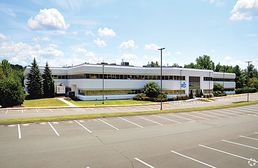
Processing Your Payment
Please do not leave this page until complete. This can take a few moments.
- News
-
Editions
View Digital Editions
Biweekly Issues
- May 13, 2024
- April 29, 2024
- April 15, 2024
- April 1, 2024
- March 18, 2024
- March 4, 2024
- February 19, 2024
- February 5, 2024
- January 22, 2024
- + More
Special Editions
- Lists
- Viewpoints
- HBJ Events
- Business Calendar
- Custom Content
Serial fintech acquirer SS&C Technologies draws legal blowback from $2.6B purchase
 Photo | Contributed
SS&C Technologies CEO Bill Stone (left) being interviewed by CNBC’s Jim Cramer in 2018.
Photo | Contributed
SS&C Technologies CEO Bill Stone (left) being interviewed by CNBC’s Jim Cramer in 2018.
More Information
Two competitors are going after SS&C Technologies in court, accusing the Windsor-based financial software and services powerhouse of using unfair tactics to gain monopoly power in key markets.
SEI Global Services Inc., headquartered in suburban Philadelphia, and New York City-based Arcesium LLC filed separate but similar federal lawsuits over the past five months, after SS&C allegedly terminated software licensing agreements with each company.
Though some court filings are sealed or redacted to protect customer names and trade secrets, the two lawsuits offer a glimpse into the complex and ever-evolving food chain of companies that provide software and services to alternative investment managers like hedge funds, private equity firms and other asset managers.
The technology allows investment managers to automate complex tasks, ranging from post-trade reconciliation to accounting and regulatory and tax reporting.
SS&C has become a significant force in that market — through numerous acquisitions it is now the largest administrator of alternative funds in the world.
“When they entered [the alternatives space], they were basically the small fish,” said Surinder Thind, an equity analyst at New York City investment bank Jefferies who covers SS&C. “Now they’ve become the big fish, and they did it against all odds, because that used to be the domain of the big banks.”
“They’ve basically built the business that is 55% of their core revenues out of nothing,” Thind added.
Becoming a big fish
SS&C has a long history in the financial technology markets.
CEO Bill Stone founded the company in 1986, and took it public a decade later, long before the software-as-a-service model that now dominates the industry was even a possibility.
In 2005, a few years after the dot-com bubble burst, The Carlyle Group acquired the company, taking it private once more. A 2010 initial public offering put SS&C back on the stock market, where it has thrived ever since, growing from $32 million in profit on $329 million in revenue that year to nearly $439 million in profit on $4.6 billion in revenues in 2019.
That ten-fold growth is the result of SS&C investing since 2010 more than $13 billion to acquire 20 companies. Since the mid-1990s, it has acquired about 55 companies in total, and today has a market cap of more than $14 billion.
In a recent telephone interview, Stone, who dismissed the recent lawsuits as “unfounded,” reflected on the company’s climb.
“Obviously we’re bigger and we have way more resources today than we had before,” Stone said. “I’m proud of the success we’ve had.”
Expect more acquisitions in the years to come, Stone said, as the strategy has worked so far.
Thind, the analyst, said SS&C has a finely tuned playbook through its deals.
“They tend to make smart acquisitions, they tend to be opportunistic and go after low-price targets, and then they are able to successfully wring out the costs,” Thind said.

Over time, the deals have grown larger. The $2.6 billion Advent deal was SS&C’s largest ever until 2018, when it paid $5.4 billion for DST Systems, scaling up its existing offerings for financial clients as well as healthcare companies — a new market.
But as the two recent lawsuits against SS&C show, consolidation can lead to new frictions.
Customer and competitor
The civil lawsuits filed by SEI Global, a publicly traded company with an $8.4-billion market cap, and Arcesium, a private firm, stem from SS&C’s $2.6 billion acquisition of California-based Advent Software.
That deal cleared antitrust review from the U.S. Department of Justice in 2015, but each plaintiff argues SS&C has recently wielded its leverage to illegally suppress competition.
The lawsuits describe an uneasy dynamic in which SEI Global, Arcesium and their clients are paying licensing fees to Advent — now owned by a competitor (SS&C) of both plaintiffs — for the right to incorporate Advent’s Geneva accounting software into their own business process outsourcing offerings.
The complaints allege that SS&C recently sought to squeeze steep price increases or other concessions from SEI and Arcesium when it was time for contract renewals, and they claim the motivation is that several of SS&C’s companies, including GlobeOp and Innovest, compete for similar customers.
“Between 2015 and 2019, peace between the companies still existed,” SEI’s complaint says. “However, SS&C decided to flex its muscles in the fall of 2019 by raising a series of disingenuous positions to gain an advantage over SEI, leaving SEI no choice but to file this lawsuit to protect itself.”
Arcesium says SS&C sought to impose a series of “predatory terms” that were “plainly impossible to accept,” including forbidding Arcesium from marketing its services to customers of Advent or SS&C, as well as to fund administrators, a key target customer.
Each company, which didn’t comment for this story, also accuses SS&C, after they balked at the offers, of terminating their respective license agreements based on alleged term violations.
For example, SS&C accused SEI of soliciting Advent employees in an attempt to hire them, the complaint says. Meanwhile, Arcesium’s suit says SS&C claimed the company had improperly marketed software access to customers after its license expired.
Arcesium CEO Gaurav Suri wrote in a court fling that switching to a new portfolio accounting platform is “extremely expensive, time-consuming and disruptive,” costing into the six-figures and taking at least a year to complete, and creating the risk of interruptions that could harm a customer’s ability to meet collateral and regulatory obligations.
“As an analogy, for hedge funds and administrators, switching portfolio accounting software is like doing a heart transplant while the patient is still trying to go about his or her daily business,” Suri wrote.
SS&C and its legal team, which have rejected the allegations, have not pulled any punches.
In the SEI case, SS&C’s lawyers have filed a motion to dismiss the suit, calling the allegations “a garden variety software licensing dispute between sophisticated parties.”
The attorneys argued that SEI’s lawsuit “fails … to meet the most basic elements of an antitrust claim.”
As for the Arcesium lawsuit, SS&C’s Stone said in June it “boils down to unfounded complaints by a disappointed licensee who would prefer to continue to use SS&C’s valuable intellectual property on terms of its own choosing.”
SS&C said the technology and software market for financial firms is “extraordinarily competitive” and called the notion that SS&C dominates or has monopolized the industry “preposterous.”
While SS&C is a dominant player in hedge fund administration, it has larger competitors in various other segments, Stone said.
“We’re not some goliath,” he said.
He also said it’s fairly common in the investment software and services ecosystem for companies to have customers that are also competitors, which he termed “co-opetition.”
“Most of the major banks are big customers of ours and they are also big competitors of ours,” Stone said. “There are interconnections all over the place.”
SS&C, Stone may stay the course in CT
SS&C Technologies Inc. has about 22,000 employees today, which is 15 times more than it had 10 years ago — growth largely spurred by an acquisitions spree.
About half of those employees are based in other countries, including about 5,000 in India.
SS&C’s Connecticut presence hasn’t seen the same explosive growth in personnel.
Today, up to 450 SS&C employees work in Connecticut, at the company’s 93,500-square-foot Windsor headquarters and Sandy Hook office, said CEO Bill Stone.
SS&C leases its Lamberton Drive headquarters in Windsor under an agreement that’s set to expire in the fall of 2022.
Stone, who moved to Florida in 2012, told the Hartford Courant the following year that SS&C would always have a presence in Connecticut, but that moving its headquarters was “more under active consideration than it was before.”
Asked about SS&C’s future in Connecticut, Stone said the state’s educated workforce and his company’s capable existing staff here are both strengths.
“I don’t see it particularly changing,” he said of SS&C’s local presence.
“I don’t know how much we’ll grow in Connecticut,” he added.
As for his own future as SS&C’s chief executive and largest individual shareholder, the 65-year-old Stone said he’s not going anywhere yet.
“I’ve told our board and most of our investors that I’m going to work for another five to seven years and make a decision then,” he said.
He said there’s a strong management team under him that could fill his shoes when the time comes.
“I’m in reasonably good health and I like the challenge,” he said. “I don’t see me changing for a while.”
Most Recent
Related Content

2022 Giving Guide
This special edition informs and connects businesses with nonprofit organizations that are aligned with what they care about. Each nonprofit profile provides a crisp snapshot of the organization’s mission, goals, area of service, giving and volunteer opportunities and board leadership.
Learn more
Subscribe
Hartford Business Journal provides the top coverage of news, trends, data, politics and personalities of the area’s business community. Get the news and information you need from the award-winning writers at HBJ. Don’t miss out - subscribe today.
Subscribe
2024 Book of Lists
Delivering Vital Marketplace Content and Context to Senior Decision Makers Throughout Greater Hartford and the State ... All Year Long!
Read Here-
2022 Giving Guide
This special edition informs and connects businesses with nonprofit organizations that are aligned with what they care about. Each nonprofit profile provides a crisp snapshot of the organization’s mission, goals, area of service, giving and volunteer opportunities and board leadership.
-
Subscribe
Hartford Business Journal provides the top coverage of news, trends, data, politics and personalities of the area’s business community. Get the news and information you need from the award-winning writers at HBJ. Don’t miss out - subscribe today.
-
2024 Book of Lists
Delivering Vital Marketplace Content and Context to Senior Decision Makers Throughout Greater Hartford and the State ... All Year Long!
ABOUT
ADVERTISE
NEW ENGLAND BUSINESS MEDIA SITES
No articles left
Get access now
In order to use this feature, we need some information from you. You can also login or register for a free account.
By clicking submit you are agreeing to our cookie usage and Privacy Policy
Already have an account? Login
Already have an account? Login
Want to create an account? Register
Get access now
In order to use this feature, we need some information from you. You can also login or register for a free account.
By clicking submit you are agreeing to our cookie usage and Privacy Policy
Already have an account? Login
Already have an account? Login
Want to create an account? Register









0 Comments